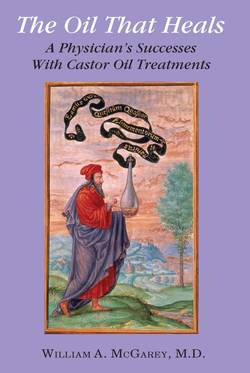Читать книгу The Oil That Heals - William A. McGarey M.D. - Страница 13
На сайте Литреса книга снята с продажи.
Chapter Four Healing as an Awakening in Consciousness
ОглавлениеEdgar Cayce, in the years prior to his death in 1945, seemed to have an affinity for castor oil. In most quarters, though, it has been held with disdain, since its action on the intestinal tract, when taken in large doses by mouth, is sometimes explosive. Nevertheless, Cayce advocated it hundreds of times in his readings, offering the oil as an aid in bringing the body back to a state of normalcy. Most often, however, it was to be applied on the body, not in it.
One inquirer, seeking help for himself from the sleeping Cayce, asked if he should take the oil by mouth. The reply was that if you have a castor oil consciousness, take castor oil. This was a revelation to me. I was just beginning to understand that Cayce, from his unconscious mind, was dealing with illnesses from a perspective that I had not yet encountered. And it began to make sense. Cayce was approaching things from the standpoint of consciousness and need. What does that mean in a practical sense?
When I first started reading the Cayce material, a patient came to see me who was very definitive in his approach to remedies. He had a sore throat and he told me that penicillin always took care of his sore throats and that’s what he wanted. Before reading Cayce’s statement about consciousness and castor oil, I would have been a bit dismayed by the man’s wanting penicillin. However, the idea of consciousness gave me new insights. Perhaps this man had a penicillin consciousness! If so, he would respond to it. And he did.
What does penicillin consciousness mean? Perhaps it is better understood as a manifestation of faith. Why, for instance, am I a Presbyterian? I was born into the faith (by choice, of course, if we truly have that power before being born), and I believed the tenets I learned in the church. So I naturally would respond, in my spiritual development, to the ideas in that church more readily than in the Baptist, for instance, or Greek Orthodox, or whatever. I had a Presbyterian consciousness.
The incident with the penicillin, along with Cayce’s statement, made it a lot easier for me to understand that everyone has a different approach, a different road to travel as he or she moves through an incarnation. And I needed to be sensitive about what would help patients most—as nearly as I could tell—in their search for healing. If they have a castor oil consciousness, they get castor oil. If they have a surgical consciousness, they undoubtedly need surgery. Or manipulation or radiation or chemotherapy. People need what they truly need until they change their own consciousness in a manner that manifests a different need.
As this bit of information sank into my awareness sufficiently to put it into action, I also became aware of another pertinent factor in the healing process: there is an awakening of consciousness—a psychic event—within the tissues of the body whenever true healing comes about. And the therapy that is used carries within it an essence, a power that enables that awakening to come about. Perhaps it is the faith mentioned earlier that is the pathway, but the power is the creative element that stimulates the atoms and cells into a new awareness. Cayce described it like this:
For, all healing comes from the one source. And whether there is the application of foods, exercise, medicine, or even the knife—it is to bring [to] the consciousness of the forces within the body that aid in reproducing themselves—the awareness of creative or God forces. (2696-1)
It has been vitally interesting for me to probe into the unconscious images Cayce presented about what we are as human beings. The “forces,” for instance. All tissue is composed of atoms, and it was Cayce’s point of view that all atoms have consciousness. Consciousness is a “force” when applied in any situation. Thus Cayce termed those aggregations of atoms and cells as “forces.” And they, knowing their origin after having been awakened by the Divine, respond by attaining their normal status. Some people call this healing, or a cure.
Castor oil packs became the first Cayce therapy I applied in my practice of medicine. It had been described so often in the readings and seemed so simple to use and so innocuous. The results seemed remarkable to me and to the patient. How could an oil pack, applied with a heating pad, bring about the resolution of an intestinal problem or an abscess of the axilla? Or a gallbladder attack? Or a phlebitis of the leg? But these things did happen, and I was compelled to look deeper.
